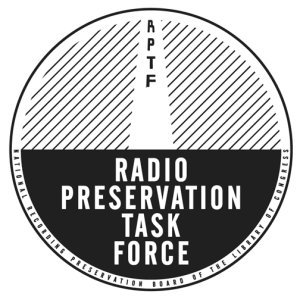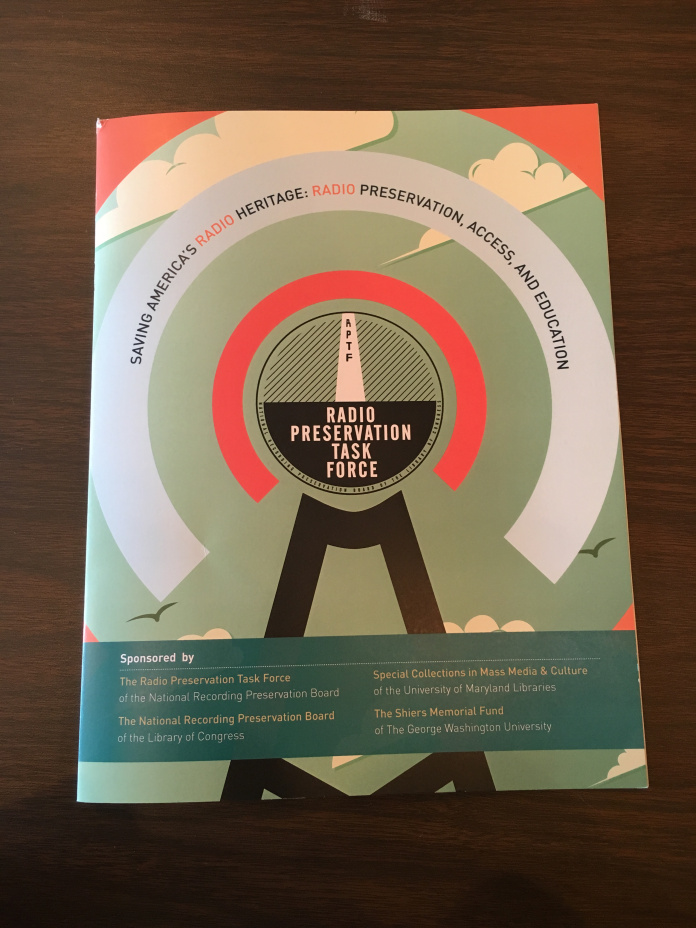Hi everyone! These past few weeks all of the NDSR-NY residents have been traveling to major preservation, archival, library and coding conferences around the country. In February, I had the privilege of attending and speaking at the Radio Preservation Task Force (RPTF) conference in Washington DC, which was held at both the Library of Congress and the University of Maryland in College Park. I wrote about my conference experience on my personal blog here with photos and a full recount of my time touring NPR, speaking on the Metadata and Digital Archiving Committee, cheering on Andy Lanset on during his plenary speech, and meeting some new friends.
Back in January, I conducted a phone interview with one of the RPTF Conference’s planners, Josh Shepperd, who gave me incredible insight into his development as a radio and communications scholar, involvement with the RPTF, and the RPTF’s future plans as major stewards of the nation’s endangered radio archives. Josh is currently an Assistant Professor of Media and Communication at Catholic University and serves as Director for the RPTF.
What I enjoyed most about talking about with Josh is how he sees radio archives not only as rooms full of unique, rare and fragile audio artifacts, but also as a powerful tool that researchers and scholars can use to uncover how underrepresented groups of people have historically used community radio to put forth new ideas and bring about social change. Ultimately, the conference itself proved that there is an incredible synergy between researchers, scholars and archivists that can be leveraged to bring about effective preservation and digitization to further scholarship and bring new perspectives to historic narratives. This idea was echoed in many of the presentations I attended, as indicated in a Tweet I threw out there during the the “Public Radio’s Local Heritage” panel I attended on the first day, featuring Karen Cariani (AAPB), Michael Huntsberger (Linfield College, OR), and Will Chase and Julie Rogers (NPR).
Audiences who record radio on air may hold secret archives of otherwise "lost" sounds. #iwanttobelieve #rptf 👽
— Mary Kidd (@shakeypea) February 26, 2016
I look forward to hearing more about how Josh and the RPTF build up the foundations they have laid so far, and suggest you follow and/or join the RPTF Facebook group and/or Twitter for more updates.
Also, in case you need a kindof tl;dr: Check out some of these links on Josh’s work, and highlights from the conference, showing that mainstream media in many ways is picking up on and paying attention to radio preservation studies (which is a very, very good thing!):
- A recent article published by The Atlantic, “Saving Historic Radio Before It’s Too Late” featuring an interview with Josh.
- The RPTF Conference Storify page, featuring Tweets and photos.
- C-SPAN coverage of Paddy Scannell’s keynote speech.
- Josh Shepperd on the conference and project goals.
Excerpts from my interview with Josh are below.
Mary: What got you into communications and in radio preservation studies specifically?
Josh: I started out in philosophy, but I began to realize that the study of media communication is a study of some of the same concepts applied in different social theories related to the “public sphere”. So, in other words, it was a very focused way to look at how people interact with each other in relation to identity, and in relation to aspirations for how to bring about change through communication and interaction.
I’m writing a history right now of the origins of public broadcasting, where I go back as far as the New Deal and the Roosevelt era, look at all the primary documents and policies in institutions and research methods that emerged, and tie that into aspirations that the different broadcasters had at the time to create something very public – something similar to public schools and public parks – but in ethereal space.
Mary: How did you come into the position of Task Force Director for the RPTF?
Josh: The Task Force was mandated by the former Chair of the National Recording Preservation Board of the Library of Congress, Sam Brylawski. He was one of the early innovators of sound preservation methods and he worked at the Library of Congress for some time. He stepped down as Chair and finished his term recently, but before he did that he started a task force, to study what he correctly thought to be really the fastest receding historical collections – which turns out to be radio – due to the passing of the Telecommunications Act in 1996. The Act opened up the opportunity for different private corporations to buy up all the radio stations in cities. All of these old collections of tapes, DATs and reel-to-reels weren’t economically viable, and they were also taking up space. As one corporation might buy up all the archives in Toledo, Ohio, they might throw out all of the recordings and the recorded history that the station had. Because of this, most radio collections have been thrown out or incinerated. For sound archivists, this was a catastrophe.
Chris Sterling is now the Chair of the Board and the Dean of George Washington University. He needed someone to come in and run day-to-day operations and do strategic planning. I was working at the time with the University of Maryland on a project at their Library of American Broadcasting. Chris caught wind that there was a young media historian in the area and recruited me to start to build the project up.
Mary: The RPTF and ARSC are working together on a metadata project. Can you talk more about how that was developed, and what that will look like?
Josh: We have a horizontalized consortium, centralized by a big data search engine being developed at Indiana University by William Vanden Dries, with participants from ARSC. We hope that that search engine will identify where all extant recordings are of radio are located, catalog them, and create finding aids for those materials. It will also house educational materials and sound recordings under fair use. Ultimately, we want to create an educational interface and be a repository of sound and local history. Broken down into multiple categories of research, we have 16 research directors besides myself now, each with a different subject area expertise. We will then use this data to curate material that we can use in the classroom.
Mary: How did you start gathering the metadata for this project?
Josh: I found that working the first two months on this project that no one in the academy has any sense of how to build metadata searches, let alone how to do an aggregation on a national scale of archival materials. During the first year, we actually had faculty in each different region contact archive after archive individually to see if they would participate. That’s how we were originally organized. We had about 100 faculty members making cold calls to different archives. Now we’re working on a series of educational and curatorial projects, along with archive searching and metadata development. The goal is really for everyone to work equally, and only verticalized by specialty.
Mary: Can you tell me about planning of the conference and how that’s going?
Josh: The conference was the culmination of the work done by the National Recording Preservation Board. We also could not have done any of this work without the guidance and support of Steve Leggett, Cary O’Dell, Gene DeAnna, Matthew Barton, Alan Gevinson and all Library of Congress employees. The conference was largely planned by me and our Program Director Michele Hilmes. She’s a professor at the University of Wisconsin who just retired. She’s probably one of the most distinguished media historians of the last 30 years.
The schedule was a mix of a very conventional academic conference where people are presenting research about the history of radio – which very rarely happens in the academy – mixed with a lot of really great archival, curatorial and metadata-building agents like yourself.
Mary: What would you say are the major long-term goals of the RPTF?
Josh: We are attempting to create a sustainable infrastructure working toward preservation and protection of major collections, as well as an attempt to mine those materials for cultural histories that has not yet been told. Certain cultural histories haven’t left good paper trails either by design of the movements, or by denial to the historical record especially in the case of subjugated groups. This is especially true for LGBT, Women’s and African American Civil Rights histories. However, some of them actually had community-building broadcasts. So, what we’re hoping is that sound trails will pick up where the paper trails leave off, historically.
Over the long-term of this project we are actually hoping to create larger registers of materials for historical research, all the way from grade school classroom exercises up to graduate-level research. Radio sounds are non-theatrical and consists of interviews, public forums, discussions and analysis. This is a goldmine for 20th century cultural history of non-dominant groups. Some of this sound material can actually be auto-transcribed. So, what we might even actually end up doing here is creating new paper trails that didn’t exist before over the course of 5 to 10 years.
Mary: What do you see are the biggest challenges for radio archivists?
Josh: There are three major issues. Shelf space is number 1, and is probably the biggest problem. We simply have to house these things. Number 2, cataloging, and making the metadata discoverable. Number 3, deciding how we going to share these materials.
We’re actually are going to start applying for grants this year, but the thing is, as a Library of Congress Project, we can’t receive the grants. They have to go to specific institutions that are our affiliates. Our job is to work in service and promotion of the work being done at these archives, and to connect preservation to educational initiatives as one process.
Mary: Do you plan on having this conference once a year going forward?
Josh: We’re not so sure there’s going to be more conferences. I think there might be one in 18-24 months as a follow-up conference that will be much smaller and address progress that’s been made. As the project grows, we’re open to suggestions, participation, and engagement on these questions. Since a project like this can’t by definition centralize the process, it’s an excellent opportunity to build bridges between different communities for a common goal.

